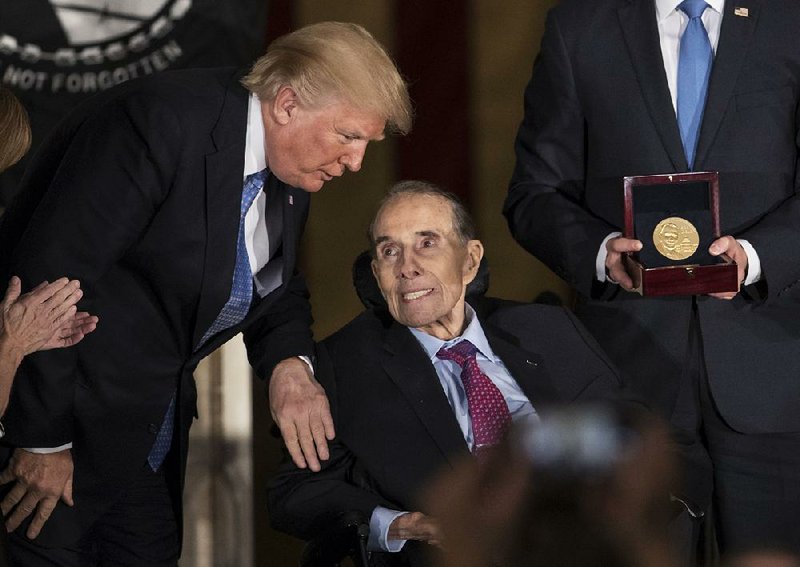WASHINGTON -- Former Senate Majority Leader Bob Dole knew the art of the deal before President Donald Trump published the 1987 book of the same name.
The two shared a stage under the Capitol dome Wednesday as Dole, 94, accepted Congress' highest civilian honor, the Congressional Gold Medal, for his World War II service and decades of work in the House and Senate.
Trump, meanwhile, was mired in a pitched budget battle that threatened to end in a government shutdown at week's end.
Nonetheless, the president saluted Dole as "a patriot" and gave tribute to Dole's struggle as a veteran who worked his way back from a grievous shoulder wound that he suffered in Italy.
"He knows about grit," Trump said.
But it was Dole's penchant for working across the aisle that earned him his latest award, according to the legislation Trump signed in September.
"Bob Dole was known for his ability to work across the aisle and embrace practical bipartisanship," reads the legislation. Some of the award's 300 recipients include George Washington and Mother Teresa, according to the Congressional Research Service.
Dole said that much of his best thinking was done while gazing from his West-facing offices in the Capitol the length of the Mall, past the Washington Memorial and across the Potomac River to Arlington, Va.
"Leadership," he said in remarks read by wife, Elizabeth, "begins with the long view."
Bipartisanship is a concept not often embraced these days, especially under the president Dole endorsed during the 2016 election. Trump's profanity-laced meeting with lawmakers of both parties on immigration last week blew up whatever courtesy may have existed between him and Congress at the start of 2018. Dole has never been known for such a tone or attitude.
"If there's anyone who has mistakenly attached themselves to our party in the belief that we are not open to citizens of every race and religion, then let me remind you," Dole said during his acceptance speech at the 1996 Republican National Convention. "Tonight, this hall belongs to the party of Lincoln. And the exits, which are clearly marked, are for you to walk out of as I stand this ground without compromise."
Dole reached for the White House multiple times -- as Gerald Ford's running mate in 1976, in Republican presidential primaries of 1980 and 1988, and finally as the GOP's nominee in 1996. He lost in an Electoral College landslide to Democrat Bill Clinton.
Dole, born in Russell, Kan., grew up during the Great Depression and was a pre-med student at the University of Kansas when he enlisted in the Army. He was grievously injured during an offensive in Italy as he tried to save another soldier. Despite multiple surgeries, Dole was left with a mostly unusable right arm and clenched hand, in which he often put a pen. He was awarded two Purple Hearts and a Bronze Star, among others.
"He was a hell of a leader," former Sen. John Warner of Virginia said Wednesday. "For all of the meaning of the medal he's getting today, the Purple Heart is the one he really cherishes."
Dole was a lifelong advocate for disabled Americans, highlighted by the key role he played in advancing the Americans With Disabilities Act in 1990.
By then, he had begun collecting more of the nation's highest honors. President Ronald Reagan gave Dole the Presidential Citizens Medal in 1989. Clinton followed up with the Presidential Medal of Freedom, the nation's highest civilian honor, in 1997.
"Son of the soil, citizen, soldier and legislator, Bob Dole understands the American people, their struggles, their triumphs and their dreams," Clinton said at the time.
Dole displayed some trademark wit in thanking the other speakers for the "kind words." He said: "They're probably not true, but they're kind."
Information for this article was contributed by Darlene Superville of The Associated Press.
A Section on 01/18/2018
